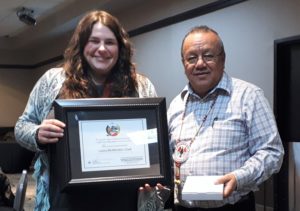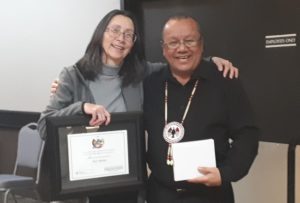Tremendous attendance continues at 4th annual Anishinabek Health Conference

By Lynne Brown
SAULT STE. MARIE, ON—For three days in January, a very special conference, now in its fourth year, takes place to honour, reflect and dive deep into issues as they relate to the complex web of health.
Anishinabek Nation health transformation continues to be at the centre – and as Elder Mary Elliot shared in her closing address to delegates on Jan. 26.
“My heart is full because of everything that has happened here. The drum is calling us together – our families, our communities are at the heart of who we are. Each and every one of us has been given gifts from Creator. As we get older, there is a time when we are going to turn around and look at the tracks we have left. We have to be sure that we leave this place remembering to leave good tracks for the young ones to follow. To be there for the healing of our spirit.”
The Anishinabek Nation, led by the tremendous team comprising the AN Health Secretariat, organizes the annual conference that draws delegates from the 40 First Nations within the vast geography of the Anishinabek Nation.
Aabideg kwii-zhowendaasiitomaanaa gdoo-jijaakominaa wii-noojimoying ‘We need to be kind to our spirit to heal’ Health Conference took place Jan. 24-26 at the Quattro Hotel & Convention Centre in Sault Ste. Marie, Ont.. Approximately 200 delegates working within the diverse spectrum of the health field came together, along with several keynote speakers, workshop presenters, Elders and guests, cultural artists and vendors, to lift and contemplate health transformation. Bob Goulais returned as master of ceremonies, keeping momentum moving forward at a conference that was so well-attended that some workshop venues were moved to accommodate for more participants.
The feedback that was consistently heard from several delegates and presenters was how important and meaningful these conferences are for the continued work of front line workers, health directors, support personnel, Elders and navigators in the ongoing work of health transformation – spiritual, physical, emotional and medical.
Naandwechige-Gamig Wikwemikong Health Centre’s Kim Manitowabi (Administration Support) and Mary Aiabens (Registered Practical Nurse Liaison) both agreed that the conference was “very informative all around”.
“I was looking forward to this conference since I first read the agenda. I have so much new information to bring back with me. Carol Hopkins was outstanding,” shared Aiabens.
Carol Hopkins, Executive Director, Thunderbird Partnership Foundation and 2017 Governor General Award recipient, was a featured keynote speaker on day two.
Hopkins’ presentation on ‘Mental Health and Substance Use’ particularly resonated with the two health professionals from Wiky Health Centre.
“We are immediate and first point of contact. We need to always be reflecting on empathy – ‘How am I listening to someone – being present? Are we empathetic and open minded?’” said Aiabens. “Carol Hopkins’ presentation gave me a lot to think about. It was very helpful.”
Kim Manitowabi spoke about a workshop she participated in on day one, ‘De-stressing’, facilitated by Indigenous Diabetes Health Circle.
“The de-stressing workshop was fantastic. I learned helpful techniques for self-care,” she said. “Our jobs are very busy and if we don’t de-stress, we aren’t going to be as productive – as healthy. We won’t be able to sustain our own capacity for well-being. Given the opportunity, I would definitely come back to a future conference.”
“It is very well organized,” expressed (IDHC) Indigenous Diabetes Health Circle’s Kathleen LaForme, Family Wellness Coordinator (South) and Crystal Bomberry Family Wellness Worker (West).
“I appreciate the wide variety of topics and interest that will be of benefit for front-line workers to take back to their communities,” said LaForme, who was attending her second health conference. “My session on de-stressing was very well-attended.”
In fact, IDHC’s workshop was so well-attended that it had to be moved to a larger space.

“People were very receptive to yoga practices – breathing and movement that emphasizes mindfulness. Steady breath and body alignment – promotes concentration and focus – it prepares the body for meditation.”
LaForme currently works out the IDHC Hamilton office and noted that she valued the opportunity to reconnect with colleagues.
“Our challenge is to truly internalize and understand the benefits of balance – of taking a holistic approach to health,” shared Bomberry. “Small steps are actually monumental to the big picture. People sometimes want quick success, but small steps contribute to success and need to be celebrated and acknowledged. Enjoy the journey – one day at a time.”
Bomberry stated that bringing, sharing and receiving resources at the conference, as well as the ability to network was a wonderful opportunity.
One of the conference highlights was the annual announcement of the ‘Heroes in Health Award’ recipients. Community Heroes in Health build capacity within First Nations territory by empowering residents to become more active, healthy and improve the overall well-being of the community. They are recognized for outstanding leadership, mentorship and best practices in each of their respective community health programs. Each year, there is a call for nominations and 2019’s award recipients are a diverse group of individuals, working in various capacities throughout the Anishinabek Nation.
2019 Heroes in Health Awards were presented by Anishinabek Nation Grand Council Chief Glen Hare during the lunch break on day one. The following seven individuals received an award:
- Laura McMeekin-Clarke, Sagamok Anisnawbek Physical Wellness Worker;
- Monika Hendrick, Chippewa of the Thames Community Health Department Team;
- Malynda Maness Henry, Early Childhood Educator, Dago Maajiigoog Binoonjiinyag Program;
- Joanne Culley, Registered Nurse, Aamjiwnaang Health Department;
- Pam Nolan, Manager Health and Social Services, Garden River Wellness Centre;
- Chief Peter Collins, Fort William First Nation, whose long-time community advocacy work in health, justice, social and economic well-being was acknowledged; and
- Tom Bressette, Kettle & Stony Point First Nation, was also recognized for his long-time community advocacy work, including as a founding member of the Southern First Nations Secretariat, Mnassged Child and Family Services Agency, and the Southwest Regional Health Access Centre.
The work of the Anishinabek Nation Health Secretariat continues with health transformation as a guiding principle. First Nations have been advocating for many years for increased control over their health and wellness, consistent with the inherent right to self-determination.
At the 2018 Health Conference, Anishinabek Nation Health Director, Jamie Restoule and former Anishinabek Nation Grand Council Chief Patrick Madahbee shared insight with attendees into movement forward on Anishinaabe health transformation. Later that same year, First Nations Engagement Sessions began and are continuing, as comprehensive system changes are explored.
‘It is not about providing more resources or merely tweaking policies, or structures. Health System Transformation is about Anishinabek Nation communities being free to exercise control over the design and delivery of our own health and wellness. This will result in healthier First Nations and citizens. No one cares more about our people and the generations to come than we do.’
Grand Council Chief Glen Hare closed the health conference with an inspiring speech.


